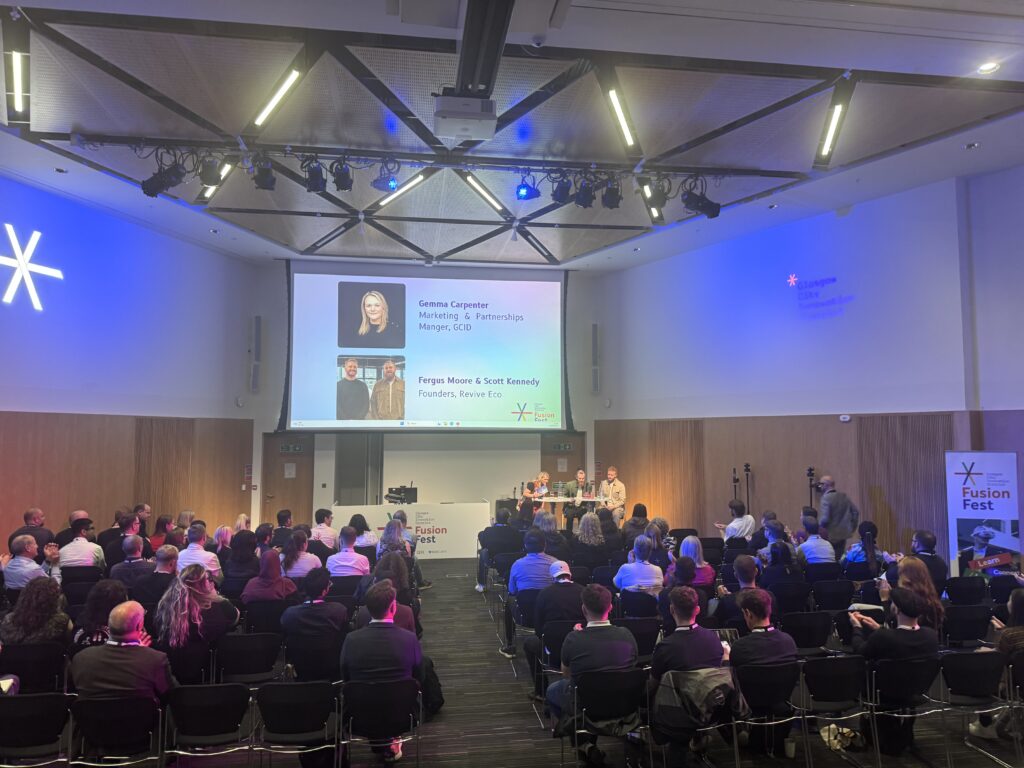A Glasgow-based sustainability venture that turns spent coffee grounds into skincare products is looking to a future of AI-powered smart mirrors – to tell you what you need for a healthy glow.
Revive Eco, a green biotech company founded 10 years ago after students Fergus Moore and Scott Kennedy, who studied entrepreneurialism at Strathclyde University, shared a joint passion for entrepreneurship and coffee.
The pair, who worked in cafes, saw how used coffee grounds were being wastefully being thrown away at the end of each shift – and were motivated by both the environmental impact as well as a potential business opportunity.
The duo were speaking at the annual Fusion Fest yesterday in Glasgow, an event hosted by Glasgow City Innovation District, as part of Glasgow Tech Week.
Moore said: “At the end of every shift, we went through a whole lot of different ideas, turning it into fertilizer, doing loads of different things with it. But fast forward to where we are today. We now have a patented process to create coffee oil from spent coffee grounds, with the main application then being cosmetic sector, to replace virgin ingredients like palm oil, coconut oil.
“So we’re really trying to disrupt different industries and show that the sort of traditional materials that you would use, you can create much more sustainable and circular alternatives from a more renewable source.”
The company – which has secured investment from a range of sources, including high-net worth angel investors and Strathclyde University itself – is working with international cosmetic brands, as well as trying to find a way to roll out its intellectual property (IP) across the world. Whilst the company works at scaling its ingredients across global supply chains, it has also sold its products direct to the consumer. The firm’s coffee-oil based topical skin serum has natural anti-oxidants and can be applied to the skin in moisturiser, as a cleanser, or a scrub. Its body scrub is available on Amazon.
In future, Moore said the skincare industry will start to leverage the power of AI-powered smart technology.
“So we were at In-cosmetics recently, which is a huge cosmetics conference, and they were speaking about the kind of future of skincare generally,” he said. “And they were saying in 15 years time you would wake up in the morning, you’ll go through to your smart mirror, it’ll detect how much sleep you’ve had, and say, ‘Okay, here’s the skincare that you need to put on to benefit your skin.
“You’ll then have your smartwatch on that will be connected up, and it will say, ‘Okay, you’ve had X amount of UV today, so here’s what you need to put on now to kind of combat that.”
The event kicked off with a talk from tech evangelist Jason Bradbury, followed by Greg Williams, the global editorial director of WIRED, who told the audience that we are living through a period of rapid technological acceleration – with increasing adoption levels helping to transform industries at an unprecedented rate.
As one example, agentic AI is helping to generate $3.5 billion in productivity gains for tech giant IBM, the company’s Deborah Threadgold said.
“We’re at a really pivotal time,” she said. “We’re seeing agentic AI really grow fast. It’s a massively, massively powerful technology that can really make a difference in terms of scaling, but also in terms of the impact.”
She said: ”And so in Coventry and Warwickshire University Hospital, by applying AI, they actually have managed to introduce 700 additional appointments every single week, and as they do that reduce the number of missed appointments by 6%.”
Threagold said AI and automation technologies are also helping companies to scale fast. They are now looking beyond experimenting with the technology, and to secure real return on investment. Banks, for example, are starting to look to intelligent agents to improve the way they do customer service, and developers are using AI to automate millions of lines of code.
“So, you see this whole period of AI experimentation is actually now behind us, and one can say that we’re at a really, really pivotal time, because we’re starting to see the emergence of a whole new form, or a whole new class of software that we call the AI agent,” she said.
She added: “And over the next four years, we expect to see 1 billion new applications being developed. And of those 1 billion new applications, we will expect to see agent AI agents being about one third of that. So when you start to think about the scale of AI agents, you can see just what a powerful technology that this is going to be.”
She said IBM’s own Watson Orchestrate AI tool allows clients to build and deploy an AI agent within five minutes. Internally, the company used the tech to cut 125,000 hours of human resources time per quarter, and sales prospecting time by half.
